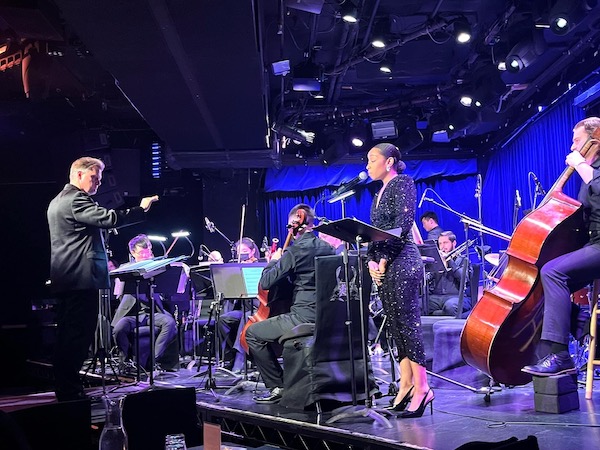Helix! reflects social justice streams with Bryan cantata, diverse new works

Courtney Bryan’s one-movement cantata Yet Unheard, composed in memory of Sandra Bland, a black woman who died in police custody in 2015, is a haunting, thought-provoking work on its own. But in the context of the concert by the chamber ensemble Helix!, conducted mostly by Kynan Johns at Le Poisson Rouge Sunday night, the feeling of loss was keener still.
Helix!—the punctuation is theirs, although if you want to add an exclamation point to your group’s name, it’s probably better to do it with the quality of your playing than with a keystroke—is the new-music ensemble of the Mason Gross School of the Arts at Rutgers University.
Clearly Sunday’s program of music by established and student composers, including five world premieres, came from a school that is not your grandfather’s music conservatory. The Mason Gross School’s mission statement reads in part: “to create socially relevant art, foster diverse programming and curricula, cultivate community partnerships…” The evening’s offerings embraced everything from Cuban street bands to twelve-tone composition to a Russian novel.
That this celebration of many cultures should end with a work about a young woman who, in effect, died of being “othered” by an unfeeling society brought a listener up short.
Sandra Bland, a 28-year-old office worker and civil rights activist, was jailed after an altercation with a police officer during a traffic stop in Waller County, Texas. Three days later, she was found hanged in her cell. The death was ruled a suicide.
In response, composer Bryan worked with poet Sharan Strange to create Yet Unheard, a piece for orchestra, chorus and soprano, in which a Greek-style chorus reflected on the story while the soloist articulated the victim’s state of mind. Bryan later arranged the work for chamber ensemble, reducing the chorus to a vocal quartet.
Sunday’s performance began in an eerie haze of glissando string chords and scene-setting words from the expressive quartet of soprano Lauren Barchi, mezzo-soprano Lauren Curnow, tenor Michael LaPorte, and bass Vincent Grana.
Soloist Joel Dyson as Sandra Bland stood at a microphone, singing softly or speaking when ruminating on her situation and how she got there (“What did he see that prompted such rage?”), or stepping back to unleash her full soprano power in moments of anguish or protest.
Under Johns’s firm direction, the orchestra created moods ranging from fierce agitation driven by booming timpani (from Yu Cheng Chang, the evening’s busy and versatile percussionist) to long-held chords over soft piano arpeggios in the more thoughtful moments.
The chorus-quartet challenged the audience from the piece’s early bars (“Break through fear, push back hatred’s stone/ It’s an honor to protest for her”) to supporting Sandra’s final fortissimo plea, “Will you say my name?” The piece closed on a long orchestral diminuendo, leaving the listener to wonder and reflect.
The work’s impact was undeniable, despite difficulty understanding Strange’s text in places, no printed copy having been provided.
Dyson was also the soloist in the program’s preceding work, Negative Space by Leila Adu-Gilmore, who is of New Zealand European and Ghanaian ancestry. The piece mused quietly on the shooting death of Trayvon Martin in Florida, with Dyson leaning close to the microphone like a jazz singer. In a subtle irony, the brief piece opened with spacious, Coplandesque wind chords but closed on the line “I exist in a negative space.”
What was lost in such violent events—the treasure of each human mind and spirit—was amply conveyed during the rest of the evening, which began with the vibrant Indigena, a 1991 piece by the veteran Afro-Cuban composer Tania León. Playful, atonal solos led to lurching Latin rhythms as a sassy trumpeter led a Carnival parade.
Ethan Isaac’s A Conspiracy of Feeling, inspired by a 1920s Russian novel and play, evoked post-revolutionary moods in an almost Elgarian sweep of broad melody and nostalgia.
Hanna Kendall’s Vera began with the “white notes” in bouncy pizzicato strings and clarinet, then went full twelve-tone in a smoother, darker passage, never quite losing its playful attitude.
Copland’s influence could be heard in the long pretty woodwind lines, dancing strings, and fervent peroration of Sergio Guerrero’s After Evening Thoughts. Kyle Valorose brought a big-band sound to Memory Grooves, recalling childhood plane rides and New York tourism with massed winds, a brushing jazz beat and a charmingly fractured foxtrot.
Tashkent-born Elena Kats-Chernin lavished sonic imagination on the textural novelties and clashing clusters of Cadences, Deviations, and Scarlatti. The relentlessly colorful, atonal set of variations seemed about to end several times, and perhaps should have sooner.
“Orion” from Constellation Suite by Jason Capehart depicted the mighty mythological hunter by pounding out a cinematic march led by trumpet and trombone flourishes and relieved by a sinuous flute solo. Movie-style energy also went into “The Beast,” a movement from Em Savarese’s forthcoming Confrontation, as tom-toms boomed and hands clapped to ever-shifting rhythms, while a Spanish-style melody slid through the string section.
Two Hispanic Dances by the young Spanish pianist-composer Jorge Tabarés wound biting flamenco rhythms around a plaintive oboe and chugging strings. Flutist and composer Valerie Coleman wove evocative lines for alto and standard flutes through Freedmen of Five Civilized Tribes for flute, clarinet, violin, cello and piano, a misty tribute to the cultural exchange between Native American nations and the former African slaves who were accepted into them.
Most of the program was conducted by Kynan Johns, who expertly managed the often-novel instrumentation and shifting meters. Christopher Beckett, an African-American graduate student in conducting at Mason Gross, ably led the pieces by Guerrero, Capehart and Coleman.






